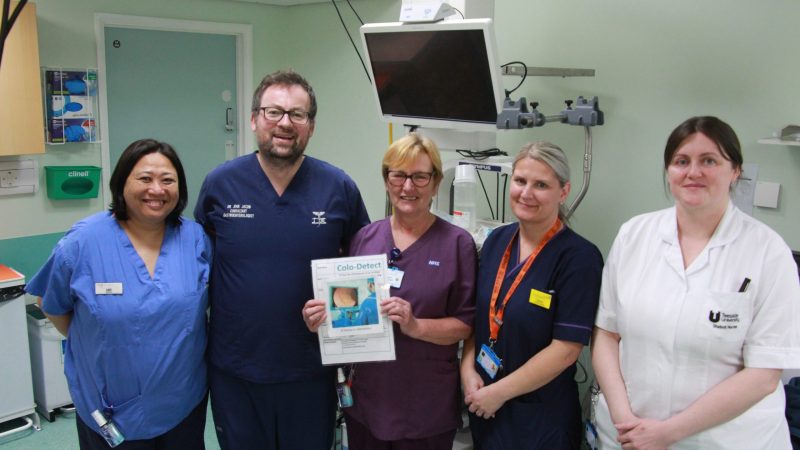
Trust staff are helping find out if artificial intelligence could help catch bowel cancer more quickly – as part of a national research trial.
Our endoscopy team and research team are part of a study investigating the impact of cutting edge technology.
The Trust is part of the Colo-Detect study which is looking into the effect the GI Genius Intelligent Endoscopy Module could have on the detection of abnormalities such as polyps and cancer.
This is in comparison to performing a standard colonoscopy. This involves the use of a long, thin, flexible tube with a small camera used to take images of the bowel.
The special technology connects to existing endoscopy systems and analyses real time images from the colonoscope camera live feed using artificial intelligence.
It then highlights areas (with a green box) to the colonoscopist that would benefit from a more detailed inspection.
John Jacob is a consultant in gastroenterology and principal investigator. He said: “Our highly skilled team in the unit are very experienced at performing the colonoscopies to help detect any issues a patient may have in the bowel and we are proud to be a bowel cancer screening centre.
“But, while this is the case, if technology can help assist the team in finding any pre-cancerous polyps early, then we want to do this for the benefit of our patients
“The earlier we can detect any issues, the better the outcome is for our patients.
“I want to thank every patient who has agreed to be a part of the study so far. By doing so, they really may be helping make a significant difference to future care.”
Our commitment to research
Barbara Campbell is lead research nurse for the study at the Trust. She said: “This study is part of a wider commitment we are making to research the use of new technologies in our endoscopy department to improve outcomes for patients.
“This study is looking at whether artificial intelligence can increase the number of pre-cancerous polyps we can find when patients have a colonoscopy – and helping prevent more cancers in the future.
“We’ve been overwhelmed by the fact that more than 250 people have agreed to take part in this piece of important research at a time when they are often worried about their own health.”
Randomised participants receive either GI Genius assisted colonoscopy or standard colonoscopy.
The results of the colonoscopies are recorded. They will be analysed to evaluate the effect of the GI Genius in detecting abnormalities such as polyps and cancers.
The study is being led by:
